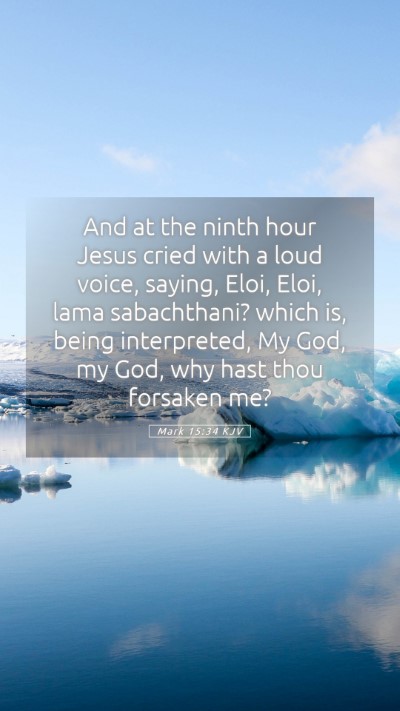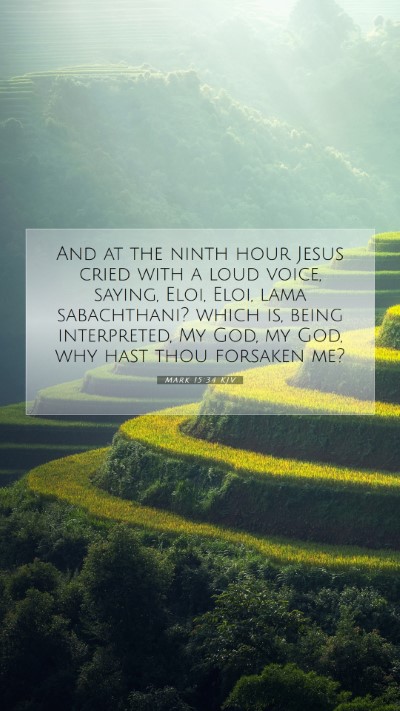Understanding Mark 15:34
Mark 15:34 states: "And at the ninth hour Jesus cried with a loud voice, saying, Eloi, Eloi, lama sabachthani? which is, being interpreted, My God, my God, why hast thou forsaken me?"
This profound statement made by Jesus on the cross opens up several avenues for deep Bible verse interpretations and explanations. In this commentary, we will delve into the meanings using insights from prominent public domain commentaries.
Contextual Background
The setting of this verse is critical to understanding its significance. It takes place during the crucifixion of Jesus, the culmination of a series of events that unfold His passion and suffering. Just before making this statement, Jesus endured immense physical pain and spiritual desolation.
Exegesis of Mark 15:34
Matthew Henry Commentary
Matthew Henry suggests that Jesus’ cry reflects His deep anguish and fulfillment of prophecy. The phrase "My God, my God, why hast thou forsaken me?" points to Psalm 22:1, indicating Jesus’ fulfillment of suffering foretold in the scriptures. Henry explains that this utterance was not only a cry of despair but also a moment of identifying with human suffering.
Albert Barnes Commentary
Albert Barnes takes a closer look at the Aramaic phrase emphasizing its intimate cry towards God. This call signifies both abandonment and a plea for divine assistance. Barnes emphasizes that, despite feeling forsaken, Jesus still addresses God as 'My God', showcasing an unwavering relationship amid suffering.
Adam Clarke Commentary
Adam Clarke elaborates further, discussing the cultural significance of Jesus quoting Psalm 22 to express His desolation. He highlights how such expressions of grief were familiar in Jewish tradition, allowing believers to connect their own suffering with Jesus’ ultimate sacrifice. Clarke interprets this as a moment where Jesus embodies the weight of sin, thus feeling forsaken.
Theological Implications
This verse and its interpretations have led to significant theological discourse concerning the nature of Christ and the concept of abandonment. The anguish expressed is crucial for understanding atonement and the depth of Christ's sacrifice on humanity's behalf.
Application in Daily Life
Mark 15:34 encourages believers to reflect on their own moments of feeling forsaken or abandoned. It resonates with anyone going through deep distress, affirming the notion that Jesus understands their pain.
Bible Study Insights
- This verse invites Bible study groups to explore both the historical and theological contexts of Jesus' suffering.
- Online Bible study resources can provide deeper analyses and varied interpretations of this profound moment.
- Utilizing Bible study tools, such as concordances, helps one understand the Hebrew Scriptures referenced and their significance.
Cross References
- Psalm 22:1 - The prophetic foreshadowing of Christ’s suffering.
- Matthew 27:46 - Another depiction of Jesus’ cry from the cross.
- Hebrews 5:7-9 - Discusses Jesus’ human experience of suffering.
Conclusion
Mark 15:34 is a complex yet rich verse worthy of thorough Scripture analysis. Its significance stretches beyond mere words, touching upon the very essence of Christian belief regarding suffering, redemption, and the nature of God’s relationship with humanity. As believers engage with this verse, they are invited to explore its depths through biblical exegesis and personal application.


